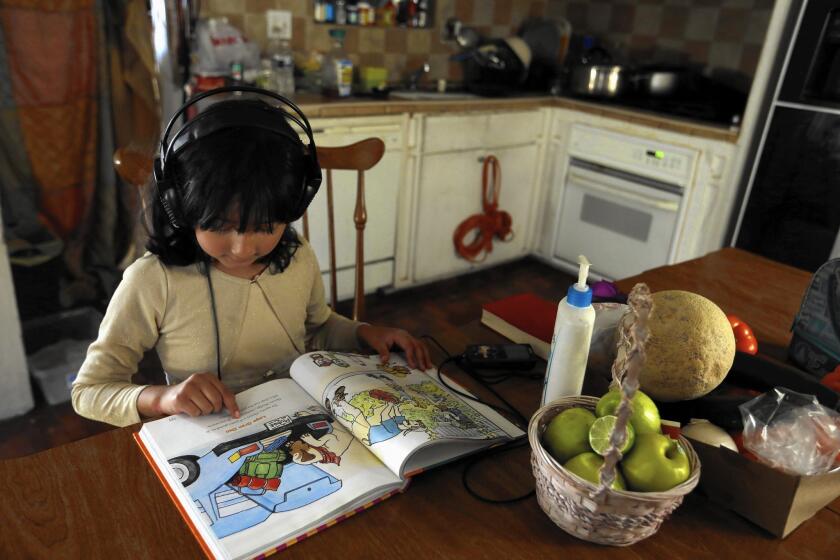Miss travel? Explore the country in quarantine through these books
- Share via
When I began my United We Read project last fall, my hope was to find community and common ground as I read my way alphabetically, state-by-state across a fractured nation. The idea was to read over the course of the year leading up to the 2020 election at least 52 books, one from each state, as well as D.C. and Puerto Rico. The first installment, which ran in January, took us from Alabama to Connecticut.
Never did the thought cross my mind that in a matter of months, reading might be the only way to inhabit other states and countries. As we find ourselves increasingly physically isolated, we’re finding new ways to connect from the confines of our homes. I’ve embraced teaching my USC journalism class remotely, connecting via Zoom with students from L.A. to Jackson Hole, Wyo., to Dehradun, India. I’ve joined the L.A. Times Book Club remotely. For now, I’m buying books online. Normally, I go to local bookstores such as Chevaliers and Skylight not just to purchase physical books but for personal recommendations and to be inspired by what’s on the shelves. Until they reopen, I’m ordering from their websites for home delivery.
And I’m reading differently in these strange times. I’m grateful for the structure this project provides to keep me reading because I’ve been having a hard time concentrating. More than one friend has remarked that we’re living in a Don DeLillo novel, which means I’m leaning away from existential dread on the page. More than ever I’m looking for stories that offer a sense of community, whether that’s at a school for Muslim girls in Chicago or an acquaponic farm in Hawaii.
As of this writing, I’ve gotten as far as Maine. I would love to hear your favorite recent fiction and memoir suggestions from upcoming states, so we can read along from the confines of home, but together as a community.
Here’s phase two of my journey:
Delaware
Cristina Henríquez published her excellent novel, “The Book of Unknown Americans,” six years ago. The story is set in a rundown apartment in Newark, Del., and much has changed with the nation’s immigration policy. What remains is longing for unity. The novel centers on members of the Rivera family, who acquire visas and leave a comfortable life in Mexico to rehabilitate their daughter recovering from a brain injury. The story is heartbreaking and hopeful, as a wide range of characters from the Americas navigate alienating circumstances from language to physical surroundings in search of making human connections.
52 weeks, 52 books: Heather John Fogarty explores the shared experiences of a fractured nation through a literary journey.
Florida
It’s been a while since I laughed out loud reading a novel, but Kristen Arnett is deadly funny. In her debut novel, “Mostly Dead Things,” Arnett ponders grief, love and loss as experienced by a family operating a taxidermy business in Central Florida. After Jessa-Lynn Morton discovers her father’s suicide, she must take control of the family business, while her mother copes with grief by creating art using taxidermied pieces engaged in lewd acts. At the center of Jessa’s grief lies her love for her brother and his absent wife. The book is heartbreaking, eccentric and often a little too heavy on bodily fluids for my comfort, but ultimately, it’s a story about the relationship of death and lives lived in the sticky, humid and often harsh realities of the Sunshine State.
I also want to share a second Florida book, especially worth reading in these divisive times. Romance, science-fiction and politics are genres I generally avoid, so I missed “Rising Out of Hatred,” a nonfiction page-turner by Pulitzer Prize-winning journalist Eli Saslow until a reader recommended the book for this project. (Thank you!) Raised in West Palm Beach, not far from the Mar-a-Lago resort, Derek Black, heir to the alternative-right movement and godson of David Duke, goes to college in Sarasota and undergoes a years-long transformation. He publicly renounces white supremacy. This is a must-read, so I will only say that the book challenged my thinking about whether it’s productive to engage with those whose values and belief systems so starkly differ from one’s own. Spoiler alert: Yes, it is!
Georgia
“An American Marriage,” by Tayari Jones traces a dissolving marriage of an Atlanta couple, Roy and Celestial, following Roy’s wrongful incarceration. The marriage unravels before our eyes, told largely through exchanged letters. The novel is as much about race and the failings of the criminal justice system as it is about love and vulnerability. At the beginning of Roy’s 12-year prison sentence, Celestial writes, “I’m writing this letter sitting at the kitchen table. I’m alone in a way that’s more than the fact that I am the only living person within these walls. Up until now, I thought I knew what was and wasn’t possible. Maybe that’s what innocence is, having no way to predict the pain of the future.”
Hawaii
Part Hawaiian mythology, part modern day reality, “Sharks in the Time of Saviors” by Kawai Strong Washburn traces members of a Native Hawaiian family as they come up against culture, class and poverty on the Big Island and Mainland. I was wholly unprepared for the sheer magic of this debut novel, the fierce loyalty characters have for one another and their reverence for the land. Present are the ancestors and the spirits of the island, but also the harsh realities of a changing economy and a family in crisis. Washburn’s compassion for his characters and for his native Hawaiian landscape make for a compelling story about heritage and the bonds of family.
Authors Steph Cha and Joe Ide swapped crimes stories and favorite books during the L.A. Times Book Club’s first virtual event.
Idaho
There’s a reason why Tara Westover’s astonishing memoir “Educated” has spent more than 100 weeks on the Los Angeles Times bestseller list. If you haven’t already read the book, which revisits Westover’s harrowing childhood raised off the grid by fundamentalist parents in rural Idaho, I suspect today’s headlines about science denialism in the face of a pandemic will offer an even more chilling reading. Deeply distrustful of mainstream medicine and a government they feared was always about to invade, Westover’s parents isolated their seven children and kept them from attending school or going to the doctor. The book is a testament to the power of storytelling. Westover takes us back to her mountain and shows us her world with vivid humanity.
Illinois
“The Beauty of Your Face,” a debut novel by Sahar Mustafah, tells the rich and complicated story of Afaf Rahman, the daughter of Palestinian immigrants and principal of a Chicago school for Muslim girls. In the opening pages, an active shooter walks the school’s hallways while Afaf retraces memories about a fractured family and finding hope in religion, before coming face-to-face with the gunman.
Indiana
The dreamhouse in the title of Carmen Maria Machado’s brilliant experimental memoir “In the Dream House,” is the stuff made of nightmares. Told in both first and second person, Machado’s memoir reveals a haunting consideration of being trapped in an abusive and destructive relationship with an unnamed woman, whose cabin in Bloomington, Indiana, becomes a visceral metaphor for domestic abuse. Machado writes, “the Dream House is real. It is as real as the book you are holding in your hands, though significantly less terrifying. If I cared to, I could give you its address, and you could drive there in your own car and sit in front of that Dream House and try to imagine the things that have happened inside.”
Iowa
Full of humor and heart, especially for chickens, “Barn 8” by Deb Olin Unferth is a comic-political novel that takes on Big Ag and the ethics of the American egg industry. Unferth weaves in philosophical questions about our relationship to animals and the environment. I confess, I even considered veganism for a few pages. Her message is urgent. She writes, “The world is failing, but we can fight back.”
Join our community book club. Our mission is to get Southern California reading and talking.
Kansas
“The Topeka School,” by National Book Award finalist Ben Lerner — who won a MacArthur “genius” award, Guggenheim Fellowship and Fulbright Scholarship, all before the age of 40 — circles a family of two psychotherapists and their son, Adam, against a backdrop of ‘90s Midwestern tract housing. The book is obviously brilliant in its examination of toxic masculinity and rage — a topic for which I have an increasingly low bandwidth — and how we have arrived at our current political reality.
Kentucky
I was casting around for a Kentucky story when a review of “The Book Woman of Troublesome Creek,” by native Kim Michele Richardson, caught my eye. It’s a historical novel about the real-life Pack Horse librarians, who promoted literacy by delivering books to folks in the Appalachian mountains in the 1930s. And who doesn’t love a story championing beloved librarians? Richardson’s, however, tackles another piece of Kentucky history — and one I had never encountered despite having a brother-in-law living in Louisville. The protagonist is a woman who is a Kentucky Blue Fugate with the rare, real-life genetic condition methemoglobinemia, which turns white skin blue. The book examines the anguish of living in skin that is rejected by much of her community.
Louisiana
For a good two weeks last month, I couldn’t concentrate on reading anything beyond a paragraph. But I had committed to this project and I didn’t want to fall behind. I picked up “The Yellow House,” the National Book Award winning memoir by Sarah M. Broom, and then that thing happened where I became utterly lost in the pages of story beautifully told. Broom’s personal history of growing up in New Orleans East and returning home explores the notions of what makes a home. Is it one’s hometown, a physical structure, family? Broom excavates the history of her family’s house, which survives Hurricane Katrina but not the city’s bureaucracy, asking “how to resurrect a home with words?”
Maine
I’m currently reading “Olive, Again,” by Elizabeth Strout. The opening pages take place on the coastline of Maine, and I can’t help thinking about the last time I was there. My friends Zinzi and Jesse were getting married on a stretch of rocky coastline at what seemed like the very edge of the world in Small Point, Maine. Zinzi was wearing an A-line shift minidress that her mother had sewed using vintage 1970s Balenciaga cotton lace deadstock they’d found in the stacks of International Silks & Woolens on Beverly Boulevard. About 100 of us gathered, huddled together against the wind, waiting for the couple and wondering about rain. And then the light broke, just long enough for our friends to exchange vows before it began drizzling again, and we retreated to the barn. When I look back at the photos it’s hard to imagine the sheer beauty of that day, and I wonder when we will be able to come together again.
A former editor at the Times, Heather John Fogarty teaches writing and journalism at USC Annenberg. Share your book suggestions with her on Twitter @heatherjohnfog and on Instagram @heatherjohnfogarty.
Here’s how to access the new wealth of free e-books and audiobooks during the coronavirus crisis.
More to Read
Sign up for our Book Club newsletter
Get the latest news, events and more from the Los Angeles Times Book Club, and help us get L.A. reading and talking.
You may occasionally receive promotional content from the Los Angeles Times.









